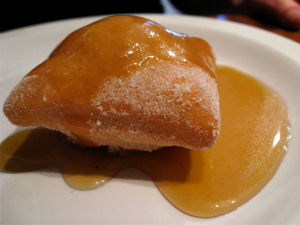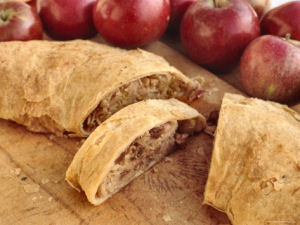
HOME
INTRO
SYMBOLS
ALMANAC
ECONOMY
GEOGRAPHY
STATE MAPS
PEOPLE
FORUM
NEWS
COOL SCHOOLS
STATE QUIZ
STATE LINKS
BOOK STORE
MARKETPLACE
NETSTATE.STORE
NETSTATE.MALL
GUESTBOOK
CONTACT US


Dbl click any word in
document for definition.
Texas State Pastries

Texas State Pastry: Sopaipilla
When House Concurrent Resolution No. 92 was introduced on March 23, 2003, it proposed that sopaipilla be named the official pastry of the State of Texas.
This changed on May 16, 2003 when two amendments were approved without opposition.
The first amendment, proposed by Representative David Hilderbran, added the wording that would expire this designation on January 31, 2005. In other words, sopaipilla would only retain the title of official state pastry for 1 1/2 years.
The second amendment, proposed by Representative Carter Casteel, added strudal as an official pastry.
House Concurrent Resolution 92, with amendments, went on to pass in the State Senate on May 28, 2003.
H.C.R. No. 92
HOUSE CONCURRENT RESOLUTION
WHEREAS, The State of Texas has customarily recognized a variety of official state symbols as tangible representations of the state's historical and cultural heritage; and
WHEREAS, Among such icons are the rodeo, the state sport; the guitar, the state musical instrument; and chili, the state dish; and
WHEREAS, In keeping with this custom, the designation of the sopaipilla and strudel as the official State Pastries of Texas shall provide suitable recognition for these historic symbols of the state's cultural heritage, for the sopaipilla and strudel are some of the earliest pastries known to have been made in Texas; and
WHEREAS, The primary ingredient of the sopaipilla and strudel is wheat flour, the use of which in Texas can be traced as far back as 1682 in Ysleta, the oldest continuously occupied community in the state; located in present-day El Paso County, Ysleta is the site of a mission established by Franciscan friars and Tigua Pueblo Indians; the Tigua planted, harvested, and ground wheat for use in meals that they prepared for the friars, and by the 1730s they were cultivating wheat for themselves; and
WHEREAS, Like the grain from which it is made, the wheat flour tortilla, too, can be traced to the El Paso area; it was produced there several hundred years ago by the Tigua, using lard from domesticated pigs, yet another item introduced in Texas by the Spaniards; the Tigua, who originally helped to raise pigs for the friars, had adopted the animals as a source for their own meals as early as the second quarter of the 18th century; and
WHEREAS, Generally made from a flour dough recipe, the sopaipilla was deep-fried in lard in earlier times and today is fried in healthier oils; it has been known by the Tigua of the Ysleta del Sur Pueblo as "Indian fry bread" for well over a hundred years and is enjoyed by them on a variety of occasions; and
WHEREAS, Widely known throughout the great State of Texas and across the nation, the sopaipilla and strudel are served in restaurants and cooked at home, both from family recipes and from store-bought mixes; the sopaipilla may be topped with honey, cinnamon, or powdered sugar and may even be stuffed with beans, meat, or ice cream; and
WHEREAS, The sopaipilla and strudel stand out among Texas pastries because of their historic origins and universal appeal; embraced today by Texans of every ethnic background, the sopaipilla and strudel constitute a much-savored part of Texans' shared cultural identity; now, therefore, be it
RESOLVED, That the 78th Legislature of the State of Texas hereby designate the sopaipilla and the strudel as the official State Pastries of Texas until January 31, 2005.
Both sopaipilla and strudel were designated official pastries of the State of Texas when Governor Rick Perry signed House Concurrent Resolution No. 92 on June 22, 2003.
Though we still see articles referring to Texas' state sopaipilla and strudel, officially Texas is now without an official pastry.
The state snack, tortilla chips and salsa, and the state railroad, also adopted in 2003, were not encumbered with an expiration date.
Texas Law

Texas State Pastry: Strudel
Sopaipilla and strudel were named the official state pastries of Texas by House Concurrent Resolution and were not, therefore, listed in the Texas Statutes.
Only a few of Texas' myriad symbols were actually adopted by an act of the legislature and written into the Texas Statutes.
Sources...
The State of Texas. Legislative Reference Library. House Concurrent Resolution No. 92. Austin: The State of Texas, 2003.
Additional Information
Strudel: The German Food Guide: The Complete Online Guide to German Food in America.
Sopaipilla: History of the Sopaipilla.
Strudel and Sopaipilla: Recipes from the Food Network.
Strudel and Sopaipilla: Recipes from AllRecipes.com.
Strudel and Sopaipilla: Recipes from Cooks.com.
State foods: Complete list of official state foods from NETSTATE.COM
More symbols & emblems: Complete list of official Texas state symbols from NETSTATE.COM.

Jane Butel's
Southwestern Kitchen
Jane Butel
Jane Butel's Southwestern Kitchen, by Jane Butel. 352 pages. Publisher: HP Trade; First Edition edition (June 1, 1994) One of the most popular regional cuisines in the United States, cooking from the Southwest--Texas, New Mexico, and Arizona--is a unique blend of Spanish, Mexican, Anglo, and Native American influences. And nobody puts it together with as much flair, and ease, as Jane Butel. Featuring traditional family recipes as well as inovative dishes, Jane Butel's Southwestern Kitchen offers the basic techniques for preparing everything from quesadillas and salsa to to chilis and tamales "and" sopaipillas! In addition to a full range of recipes for appetizers, soups and stews, vegetables, breads, and deserts, this tantalizing collection provides helpful hints and engaging anecdotes, which makes this book as pleasurable to peruse as it is to use.

